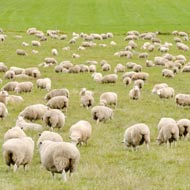
Injury to livestock can cost farmers thousands of pounds
North Yorkshire Police has launched a new initiative to close the legal loopholes associated with dog attacks on livestock.
Working with four other rural forces, North Yorkshire Police aims to gather more information about dog attacks on livestock and the power of the police to handle them.
Together with Sheepwatch UK and the Animal Health and Welfare Board for England, the forces will assess how livestock attacks are reported, recorded and dealt with, to see if the law needs to be changed or updated.
“Our experience of dealing with dog attacks suggests that there are some areas of the current legislation that could be improved,” explained chief constable Dave Jones of North Yorkshire Police. “We believe that there may be scope for the law to be tightened up, but we need hard evidence to confirm it.”
There have been more than 300 reported dog attacks in North Yorkshire since September 2013 and it is a similar picture in other rural areas. In the same period, Sussex Police reported approximately 560 dog attacks, while North Wales Police reported 400 incidents.
Injury to livestock can cost livestock owners and farmers thousands of pounds. But police and countryside campaigners fear that gaps in the current laws make it difficult to deal with the issue.
Chief constable Jones said that the definition of livestock does not cover every type of animal that a dog might attack.
“Some cases, the police can’t legally seize a dog that has been involved in an attack, which makes it difficult to prevent the same thing happening again,” he said. “And whilst livestock damage can be extremely costly for the animals’ owner, the maximum fine under law is relatively low and can be disproportionate to the loss.”
Launched on 21 March at the House of Lords, Westminster, the dog attack evidence initiative will take around six months.
Representatives from North Yorkshire Police, together with farming and livestock associations, discussed the issue of livestock worrying and dog control with MPs from the All Party Parliamentary Group for Animal Welfare.
The Forces involved in the initiative are North Yorkshire Police, North Wales Police, North Wales Police, Sussex Police, Hertfordshire Police and Devon and Cornwall Police.



 RCVS Knowledge has welcomed Professor Peter Cockcroft as editor-in-chief for Veterinary Evidence.
RCVS Knowledge has welcomed Professor Peter Cockcroft as editor-in-chief for Veterinary Evidence.